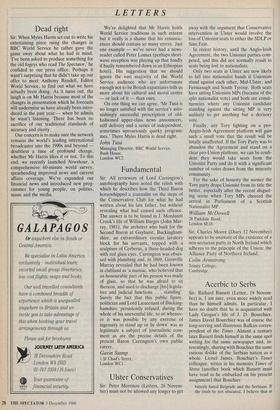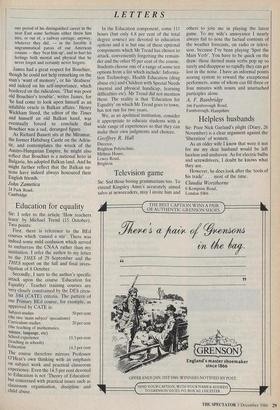Acerbic to Serbs
Sir: Richard Bassett (Letter, 19 Novem- ber) is, I am sure, even more widely read than he himself admits. In particular, I have no doubt that he is acquainted with Lady Grogan's life of J. D. Bourchier. James David Bourchier was of course the long-serving and illustrious Balkan corres- pondent of the Times. Almost a century later Bassett finds himself in the same spot writing for the same newspaper and, in- terestingly, sharing with Bouchier the same curious dislike of the Serbian nation as a whole. Lionel James, Bouchier's Times colleague, writes in his memoirs Times of Stress (another book which Bassett must have read as he embarked on his present assignment) that Bouchier
bitterly hated Belgrade and the Serbians. If the truth be not obscured, I believe that at
LETTERS
one period of his distinguished career in the near East some Serbians either threw him into, or out of, a railway carriage; anyway, whatever they did, — in the forcible if ungrammatical patois of our American cousins— they 'beat him up', and so hurt his feelings both mental and physical that •he never forgot and certainly never forgave.
James had a great respect for Bouchier, though he could not help remarking on the man's 'want of memory', or his 'deafness' and indeed on his self-importance, which bordered on the ridiculous. 'That was poor old Bouchier's trouble', writes James, for 'he had come to look upon himself as an infallible oracle in Balkan affairs.' Henry Wickham Steed, the editor of the Times and himself an old Balkan hand, was eventually forced to conclude that Bouchier was a sad, deranged figure.
As Richard Bassett sits at the Miramar, the former Habsburg Castle on the Adria- tic, and contemplates the wreck of the Austro-Hungarian Empire, he might also reflect that Bouchier is a national hero in Bulgaria, his adopted Balkan land. And he might further reflect that the Balkan na- tions have indeed always honoured their English friends.
John Zametica
24 Park Road, Cambridge



































































 Previous page
Previous page